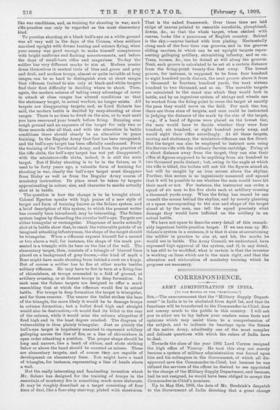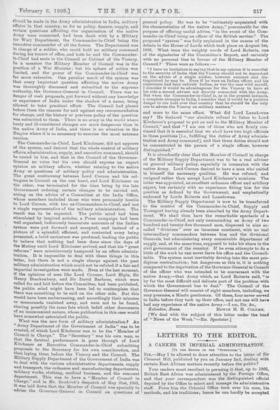CORRESPONDENCE.
ARMY ADMINISTRATION IN INDIA.
[To Ins EMTOR OF T II II "SrmaPAToie."]
SIE,—The announcement that the "Military Supply Depart- ment " in India is to be abolished from April 1st, and that its functions will be transferred to the Commander-in-Chief, does not convey much to the public in this country. I will ask you to allow me to lay before your readers some facts and opinions which may assist them to a comprehension of the subject, and to indicate its bearings upon the future of the native Army, admittedly one of the most complex and delicate questions with which the rulers of India have to deal.
Towards the close of the year 1905 Lord Curzon resigned the high office of Viceroy. He took this step not merely because a system of military administration was forced upon him and his colleagues in the Government, of which all dis- approved save the Commander-in-Chief, but because he was refused the services of the officer he desired to see appointed to the charge of the Military Supply Department, and because, had he not resigned, he would have been obliged to accept the Commander-in-Chief's nominee.
Up to May 31st, 1905, the date of Mr. Brodrick's despatch to the Government of India directing that a great change Should be made in the Army administration in India, military affairs in that country, so far as policy, finance, supply, and certain questions affecting the organisation of the native Army were concerned, bad been dealt with by a Military or War) Department, the Commander-in-Chief being the executive commander of all the forces. The Department was in charge of a soldier, who could hold no military command during his tenure of office, and both he and the Commander- in-Chief had seats in the Council or Cabinet of the Viceroy. In a measure the Military Member of Council was in the position of a War Minister ; but his sphere of action was limited, and the power of the Commander-in-Chief was far more extensive. One peculiar merit of the system was that every important question affecting the native Army was thoroughly discussed and submitted to the supreme authority, the Governor-General in Council. There was no danger of rash proposals, put forward without any knowledge or experience of India under the shadow of a name, being allowed to take practical effect. The Council had placed before them the reasons for and against any recommendation for change, and the history or previous policy of the question was submitted to them. There is no army in the world where hasty and ill-considered changes are more dangerous than in the native Army of India, and there is no situation in the Empire where it is so necessary to exercise the most extreme caution.
The Commander-in-Chief, Lord Kitchener, did not approve of the system, and desired that the whole control of military affairs, administration, supply, and executive command, should be vested in him, and that in the Council of the Governor- General no voice but his own should express an expert Opinion on military affairs, whether relating to the native Army or questions of military policy and administration. The great controversy between Lord Curzon and his col- leagues in Council on the one hand, and Lord Kitchener on the other, was terminated for the time being by the late Government ordering certain changes to be carried out, acting on the advice of a Committee at the India Office, whose members included those who were personally hostile to Lord Curzon, with two ex-Commanders-in-Chief, and not a single representative of the military administration. The result was to be expected. The public mind had been stimulated by inspired articles, a Press campaign had been well organised, ludicrously inaccurate accounts of the Indian system were put forward and accepted, and instead of a picture of a splendid, efficient, and contented army being presented, a lurid caricature was produced, leading the public to believe that nothing had been done since the days of the Mutiny until Lord Kitchener arrived, and that his "great reforms" were mischievously hampered by an effete adminis- tration. It is impossible to deal with these things in this letter, but there is not a single charge against the past military administration which could not be refuted if a fair and impartial investigation were made. Even at the last moment, if the opinions of men like Lord Cromer, Lord Elgin, Sir Henry Brackenbury, and Sir David Barbour, which were called for and laid before the Committee, had been published, the public mind might have been led to contemplate that there was something to be said on the other side. But this would have been embarrassing, and accordingly their minutes or memoranda vanished away, and were not to be found, sharing possibly the same fate which befell other documents of an inconvenient nature, whose publication in this case would have somewhat astonished the public.
What was the new form of military administration ? An "Array Department of the Government of India" was to be created, of which Lord Kitchener was to be the "Member of Counoil in Charge." The "Secretary" was his own man, so that the farcical performance is gone through of Lord Kitchener as Executive Commander-in-Chief submitting proposals to the Secretary for his own consideration, and then laying them before the Viceroy and the Council. The Military Supply Department of the Government of India was to deal with the various administrative departments, supply and transport, the ordnance and manufacturing departments, military works, clothing, medical business, and the remount department. This was to have a "Member of Council in Charge," and in Mr. Brodrick's despatch of May 31st, 1905, it was laid down that the Member of Council was specially to advise the Governor-General in Council on questions of general policy. He was to be "intimately acquainted with the characteristics of the native Army," presumably for the purpose of offering useful advice, "in the event of the Com- mander-in-Chief being an officer of the British service." The proposed "system" was fully explained in the course of the debate in the House of Lords which took place on August 1st, 1905. What were the weighty words of Lord Roberts, one of the signatories of the Committee's Report, and certainly with no personal bias in favour of the Military Member of Council ? These were as follows :—
" I have no hesitation in saying that in my opinion it is essential to the security of India that the Viceroy should not be dependent on the advice of a single soldier, however eminent and dis- tinguished he may be. Even if he were an Indian officer, and his experience had been entirely Indian, as was the case with myself, I consider it would be advantageous for the Viceroy to have at his side a second adviser not directly connected with the Army. But when the Commander-in-Chief is, as in the present instance, a complete stranger to India, I consider that it would be a positive danger to our hold over that country that he should be the only one to advise the Viceroy on military matters,"
and more to the same effect. What did Lord Lansdowne say ? He declared "our absolute refusal to listen to Lord Kitchener's proposal to put an end to the Military Member of Council," and that "I am one of those who are firmly con-
vinced that it is essential that we shall have two high officials in these positions [i.e., fulfilling the duties of Army adminis-
tration and Army command), and that these duties should not be concentrated in the person of a single officer, however distinguished."
It is abundantly clear that the Member of Council in charge of the Military Supply Department was to be a real adviser on general military policy, especially in Connexion with the native Army. Lord Curzon desired to have a man who united in himself the necessary qualities. He was refused', and resigned rather than accept Lord Kitchener's nominee. The latter was appointed, an excellent ordnance officer and artillery expert, but certainly with no experience fitting him for the position as defined by the Government, and emphatically endorsed by Lords Roberta and Lanadowne.
The Military Supply Department is now to be transferred to the control of the Commander-in-Chief, Supply and Transport having already been absorbed by the Army Depart. meat. We shall then have the remarkable spectacle of a Commander-in-Chief, not only commanding an Army of two hundred and twenty-five thousand men, dispersed in nine so- called "divisions" over an immense continent, with no real intermediary commanders between him and the divisional Generals, but administering every conceivable department of supply, and, at the same time, supposed to take his share in the civil government of the country. If he even attempts to do a little of the work he can never leave his office and the Council- table. The system must inevitably develop into the most pro- digious centralisation; but dangerous as this is, it is nothing compared to the deprivation of the Governor-General in Council of the officer who was intended to be conversant with the native Army,—that Army which, as Lord Roberts said, "is by far the most difficult and delicate part of the problem with which the Government has to deal." The Council of the Governor-General will consist of eight members, including, we may presume, a Hindu gentleman. Of these, four never served in India before they took up their office, and not one will have had any experience of the native Army.—I am, Sir, Sul,
Seivedon, Esseo. EDWIN H. H. COL.LEN. [We deal with the subject of this letter under the head of "News of the Week."—ED. Spectator.]










































 Previous page
Previous page